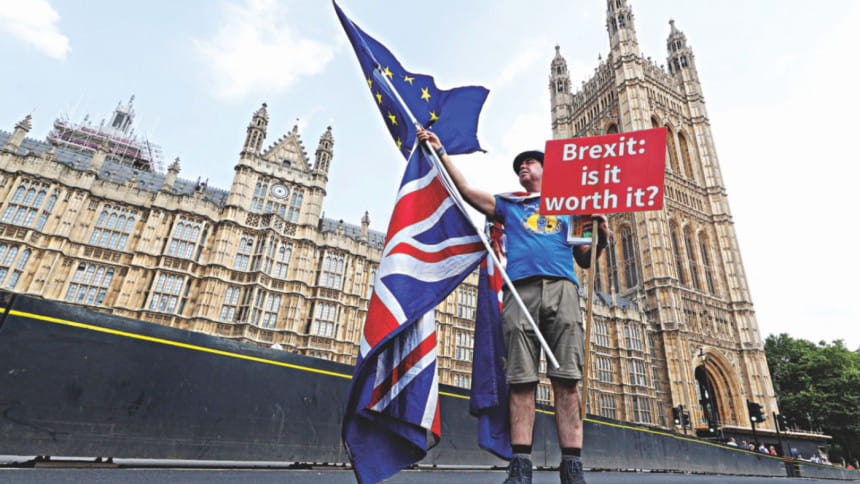A bonanza for the gaming industry during Christmas

On December 11, the British Parliament will vote on a draft Brexit agreement which the government negotiated with the EU recently. The announcement was made on November 26 by the Conservative MP and Chief Whip Julian Smith. Following some standard protocols, he also tweeted that the Brexit "Meaningful Vote debate" on the Brexit withdrawal plan will begin on December 4 and end on December 11, after five days of parliamentary debate. The debate in the British Parliament has already started, but it is not clear from the speeches and statements, both inside and outside the Parliament, if the MPs will ratify the Withdrawal Agreement, a 585-page document, next week and send it to the European Parliament and the EU Council for approval. So, readers, stay tuned next Tuesday, the eleventh of December.
At this point, it is by no means certain that PM Theresa May's own party members will vote for the agreed deal. The most contentious issues are the Irish Border plan and the uncertainty over future trade negotiations between the EU and the UK. "The agreement secures the rights of UK citizens in the EU, an agreed financial settlement, a backstop that (if used) would apply to the whole of the UK rather than only to Northern Ireland," according to a senior British lawyer. If everything goes according to May's plans, the UK will leave the EU on March 29, 2019, and then enter a transition phase until the end of 2020. During this transition period, the UK will still retain most ties with the EU, including free trade and migration, and negotiators from the two sides will work on the details of a new permanent relationship including trade arrangements. The transition period can be extended up to two years if needed. This is, undoubtedly, the best-case scenario.
Unfortunately, there are lots of ifs and buts in the various scenarios, and the British public is already showing signs of Brexit fatigue. If the PM loses the vote in Westminster, she has three options: she could go to Brussels to renegotiate the deal, decide to exit the EU without a deal, or step down as PM. There are other possibilities, too—most of them very remote: a second referendum on Brexit, fresh general elections, or cancelling Brexit. The last possibility was considered impossible until last week when the European Court of Justice's advocate general announced that the UK has the power to unilaterally revoke Article 50, the notification of its intention to leave the EU, before it quits!
Needless to point out that the uncertainty regarding the vote, and the chaos that would follow in case the deal is rejected by the parliament, is weighing heavily on British businesses as well as the common people. Christmas is just around the corner, and various media outlets are reporting that after more than two years of intense debates, speculations and uncertainty, there is a sense of weariness among the public too. The average British citizens would like for the tug-of-war over Brexit to end. According to some media reports, Theresa May is counting on the voters to convey their sentiments to their MPs, which will turn the tide in favour of the negotiated accord.
For a casual or even a slightly engaged observer like me, the negotiations leading up to the Withdrawal Agreement constituted a period of endless roller-coaster rides. Now, the possibility that May could lose the parliamentary vote and resign as PM in dismay—or be replaced with or without a no-confidence motion—has given rise to mind-boggling scenarios and betting in the media and academia. All this reminded me of the days when I was a board game expert and could beat my opponents in any game of strategy. Board games are still very popular in my household. My children grew up with Monopoly, Trivial Pursuit, Battleship, and Candyland. Since they left the house, my wife and I have embraced new ones as they come out in the market. However, the ones we grew up with, Ludo and Snakes and Ladders, are still around for us to pass time with on a lazy Sunday afternoon.
The vote in the parliament and the run-up to the March 29 exit date has been a boon for the British gaming industry. This Christmas, some of the hottest gifts on the market are board games, jigsaw puzzles, and video games centred on Brexit. Some of the popular titles are "Brexit. The Board Game", "Brexit: The Board Game of Second Chances", "Brexit Survival Activity", etc.
"Brexit: The Board Game of Second Chances" is a dice-rolling game of strategy and sabotage for 2-4 players. The new video game, "Not Tonight", set in a dystopian post-Brexit Britain, follows the struggles of a bouncer of foreign ancestry in a world of xenophobia and immigrant camps.
Some of the scenarios in these games mimic the mathematical models used by the economic forecasting industry to forecast GDP, unemployment, inflation, etc.—under some five popular alternatives discussed for the next phase of the Brexit drama: Close relationship with EU; Economic partnership; Less close relationship; No-deal: Disruptive Brexit; and No-deal: Disorderly Brexit (with no transition).
Dr Abdullah Shibli is an economist, and Senior Research Fellow, International Sustainable Development Institute (ISDI), a think-tank in Boston, USA. His new memoir, Fairy Tales: Stories from my life, will be published by Jonantik soon.










Comments